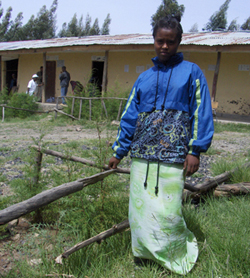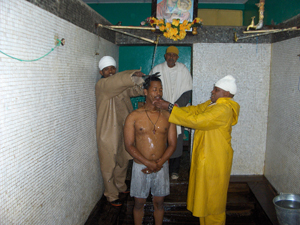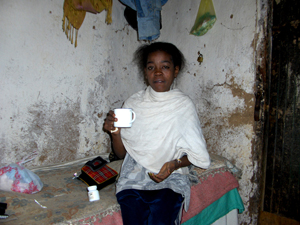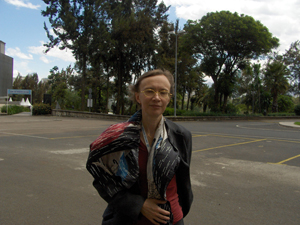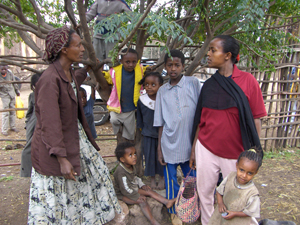Sixteen-year-old Yeshiwork Gashaw lives with her mother in Ethiopia’s northeastern Amhara region, in the remote district of Simada. When interviewed in May by ICIJ, she was taking an HIV prevention course taught by Food for the Hungry, an Arizona-based relief organization that received an $8.3 million President’s Emergency Plan for AIDS Relief (PEPFAR) grant to teach abstinence and fidelity to young people. Yeshiowork spoke of the risks girls face in Ethiopia, such as rape and abduction. She said her dream is to study accounting and that she plans to teach others about abstinence.
What does your mother do?
My mother goes to the market and sells salt, pepper and other things.
How did you hear about this program?
We had an anti-AIDS club at school and that’s how I learned about this group.
What’s the most important thing you have learned in this group?
The most important thing I have learned here is the importance of being abstinent and to be faithful. Also, if I know my [HIV] status I can educate the public.
For how long have you chosen to be abstinent?
I have chosen abstinence until marriage. Some of my friends support the idea, and some others don’t. Those who don’t support the idea call me a “countryside girl” for not having a boyfriend.
Can you say “no” to your boyfriend?
It’s impossible to have a boyfriend and not have sex. When a girl has a boyfriend, even if the woman wants to abstain, the boy [will] push to have sex. The boys insist.
Have you been in a situation like that? How did you handle it?
I told him that I didn’t want to have sex now and that I want to continue studying. I want to marry and have sex after I graduate from university.
What do you want to study?
Accounting. I would like to live in Bahir Dar.
What are some of the problems that young women face in your community?
Rape and abduction. When they are raped they commit suicide. One of my friends was raped and became pregnant. She then killed herself. I am very afraid of rape.
How old are the girls that are attacked?
Fourteen years and above.
How do you protect yourself?
They rape them when the girls go to the river to fetch water. I try to go during the day time instead of the evening.
Does your family support the idea of you studying?
Yes.
Once you complete this training, what will you do with what you have learned?
I want to work here as a team leader and teach others about abstinence.
Do you work?
I help my mother. I make coffee and injera at home.
Do you go to church?
Yes, I go to St. George Church. It’s Orthodox.
Do they talk about HIV in Church?
No, they don’t talk about it.
Ethiopian reporter Kaleyesus Bekele was the Amharic-speaking translator for this interview.
